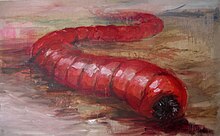

The Mongolian death worm (Mongolian: олгой-хорхой, olgoi-khorkhoi, "large intestine-worm") is a creature alleged to exist in the Gobi Desert. Investigations into the legendary creature have been pursued by amateur cryptozoologists and credited academics alike, but there has been little evidence found to support its existence. It can be considered a Cryptid or a mythological animal.
Tales of the creature first came to Western attention as a result of Roy Chapman Andrews's 1926 book On the Trail of Ancient Man. The American paleontologist described second-hand tales of the monster that he heard at a gathering of Mongolian officials: "None of those present ever had seen the creature, but they all firmly believed in its existence and described it minutely."[1]
In 1983, a specimen of Tartar sand boa (Eryx tataricus) was shown to locals who claimed to have seen "olgoi-khorkhoi" and they confirmed that this was the same animal.[2][3]
- ^ Andrews, Roy Chapman (1926). On The Trail Of Ancient Man.
- ^ "Ах, Гоби! Путешествие по Монголии в поисках легенды" [Ah, Gobi! Journey through Mongolia in search of a legend]. Novaya Gazeta (in Russian). 29 March 2012.
- ^ Kuzmin, S.L.; Dunaev, E.A.; Munkhbayar, H.; Munkhbaatar, M.; Oyunchimeg, J.; Terbish, H. (2017). Земноводные Монголии [Amphibians of Mongolia] (PDF) (in Russian). Moscow: КМК. pp. 17–18.